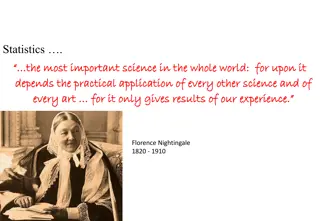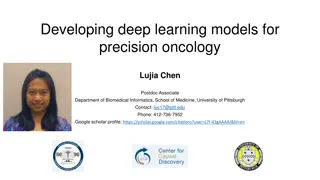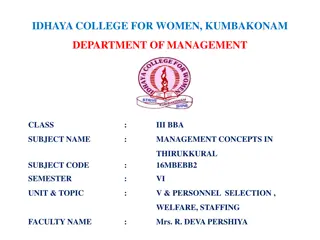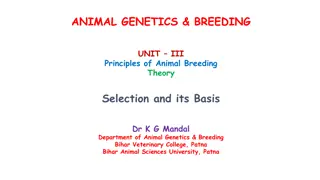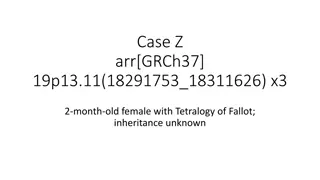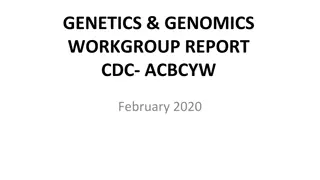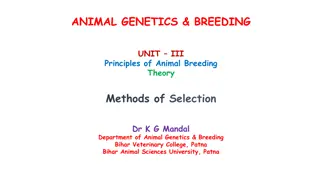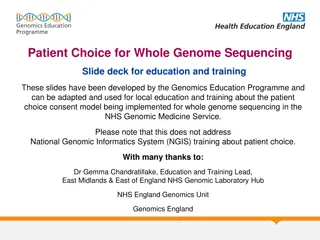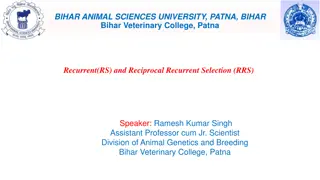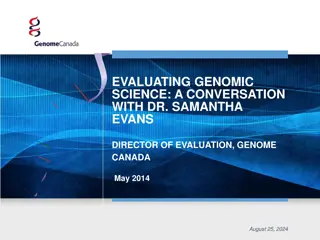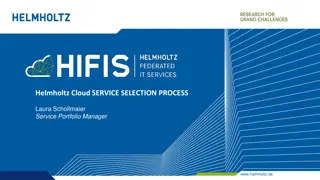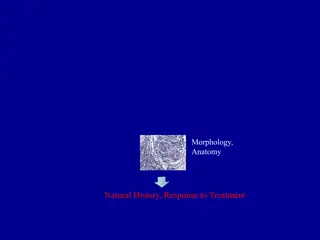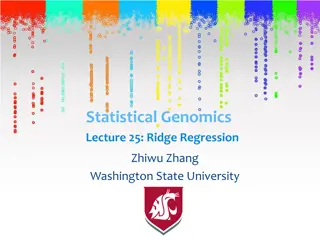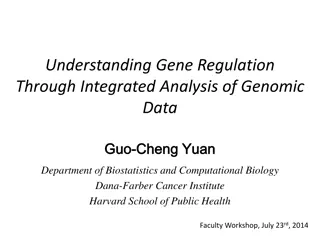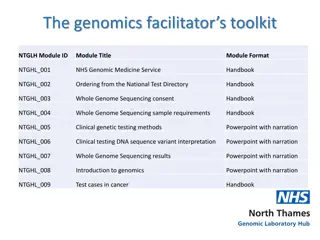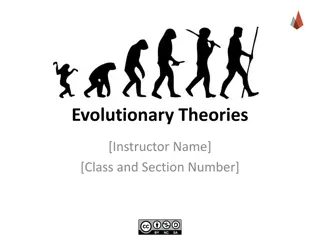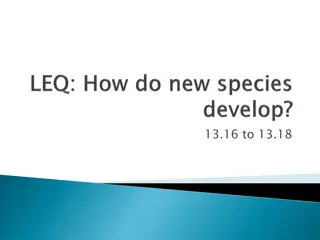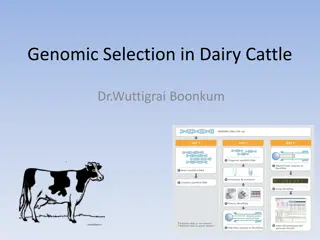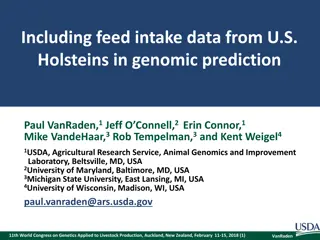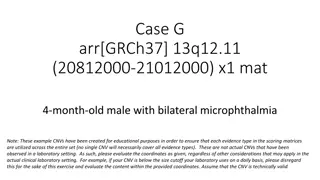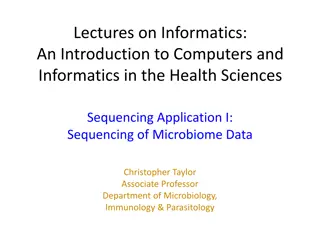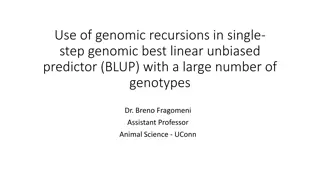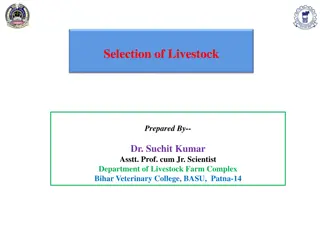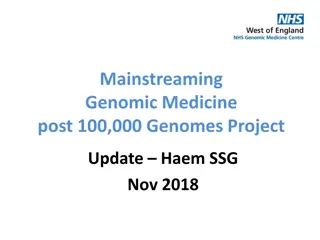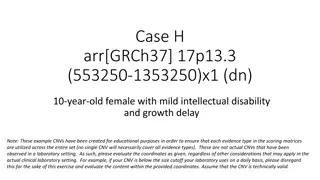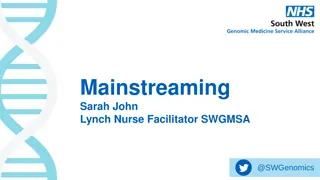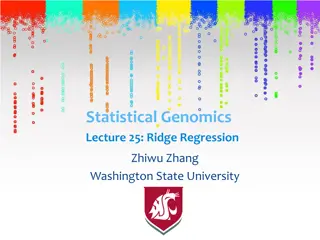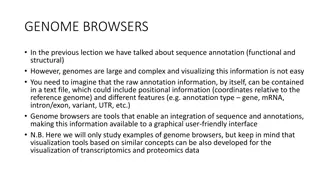INDIAN ARMY AGNIVEER SELECTION PROCESS 2024
https:\/\/youtube.com\/shorts\/3Errhs-10LM?si=gWwlhucXivM1v02s\n\n\n\nIndian Army Agniveer Selection Process 2024\nManasa Defence Academy is proud to offer the best Army training programs, including the NDA Crash Course (6 Months) and NDA Advance Course (1 Year). In this blog post, we will explore t
3 views • 1 slides
Genomic Inference of Human Population Size Changes Over Time
Explore the genomic inference of a severe human bottleneck during the Early to Middle Pleistocene transition, tracing the evolution of hominins over the last 4 million years, and studying essential events in the emergence of humans in the last one million years. Discover well-known human population
4 views • 33 slides
Latest Developments in Genomic Medicine and NHS Genomic Strategy
The genomic medicine field is advancing rapidly, with a focus on enhancing healthcare services through genomic testing for prediction, prevention, diagnosis, and precision medicine. The NHS is actively integrating genomics into its healthcare system, aiming for equitable access to genomic testing. I
1 views • 16 slides
Understanding Logistic Regression Model Selection in Statistics
Statistics, as Florence Nightingale famously said, is the most important science in the world. In this chapter on logistic regression, we delve into model selection, interpretation of parameters, and methods such as forward selection, backward elimination, and stepwise selection. Guidelines for sele
4 views • 33 slides
Precision Oncology Research using Deep Learning Models
Lujia Chen, a Postdoc Associate at the University of Pittsburgh, focuses on developing deep learning models for precision oncology. By utilizing machine learning, especially deep learning models, Chen aims to identify cancer signaling pathways, predict drug sensitivities, and personalize cancer trea
1 views • 5 slides
Lab 2: DNA Extraction Techniques for Arthropods and Wolbachia
In this lab activity, students will learn how to isolate genomic DNA from arthropods and Wolbachia bacteria. The goal is to transition from fieldwork to molecular biology, utilizing DNA as a diagnostic tool. The activity involves extracting total genomic DNA from identified species and includes pre-
0 views • 11 slides
Management Concepts in Personnel Selection and Welfare at Idhaya College for Women, Kumbakonam
The Department of Management at Idhaya College for Women in Kumbakonam offers insights into the importance of personnel selection in organizations. The process of personnel selection involves hiring individuals with the required qualifications to fill vacant positions. Proper selection and placement
0 views • 20 slides
Principles of Animal Breeding: Selection and its Basis
Selection in animal breeding involves choosing the best individuals to improve specific traits. Criteria for selection include individual merit, competitive exams, and interviews. Selection of farm animals focuses on non-random reproduction of genotypes. Types of selection include natural and artifi
1 views • 40 slides
Genomic Evaluation of a 2-Month-Old Female with Tetralogy of Fallot
This case involves a 2-month-old female with Tetralogy of Fallot, carrying a genetic variation in the 19p13.11 region. The evaluation process includes assessing genes, known dosage sensitivity, gene count, and detailed analysis of the duplication found in the DGV Gold Standard Dataset. The frequency
0 views • 17 slides
Understanding Challenges and Gaps in Genetic and Genomic Testing for Breast Cancer Risk
The report highlights current challenges and identified gaps in genetic and genomic testing for breast cancer risk assessment. The workgroup aims to catalog existing materials, address terminology confusion, and improve public and clinician education. Challenges include complex terminology, uncertai
0 views • 21 slides
Principles of Animal Breeding Theory and Methods of Selection
Animal breeding involves selecting for desirable traits to improve the overall merit of animals. Methods such as tandem selection and multi-trait selection are used to enhance genetic progress. Economic value, genetic significance, and selection criteria play important roles in the breeding process.
1 views • 16 slides
Molecularly-Guided Therapy vs Platinum Chemotherapy in CUP Patients
This trial aims to compare the efficacy and safety of molecularly-guided therapy or cancer immunotherapy based on genomic profiling with platinum-based chemotherapy in patients with cancer of unknown primary site. The study design includes multiple treatment regimens guided by genomic profiles, with
4 views • 9 slides
Patient Choice for Whole Genome Sequencing in NHS: Education & Training Slide Deck
Developed by Genomics Education Programme, these slides focus on the patient choice consent model for whole genome sequencing in NHS Genomic Medicine Service. The model aims to ensure informed choices for genomic testing, including participation in the National Genomic Research Library. It covers se
0 views • 34 slides
Recruitment and Selection Process in Human Resource Management
Recruitment and selection are vital processes in human resource management. Recruitment involves attracting candidates for job positions within an organization through various sources, both internal and external. The steps in recruitment include planning, strategy development, searching, screening,
0 views • 6 slides
Understanding Selection Strategies in Animal Genetics and Breeding
Genes influence traits through Additive Gene Action (AGA) and Non-Additive Gene Action (NAGA) in animal breeding. Recurrent Selection (RS) and Reciprocal Recurrent Selection (RRS) play crucial roles in improving animals. Selection for General Combining Ability (GCA) and Specific Combining Ability (S
0 views • 16 slides
Evaluating Genomic Science: Insight into Genome Canada's Mission and Impact
This conversation with Dr. Samantha Evans, Director of Evaluation at Genome Canada, delves into the importance of program evaluation in genomic science. Genome Canada aims to connect ideas, invest in science and technology, and maximize impacts across sectors. The evaluation process involves collect
0 views • 36 slides
Selection Board Training and Human Resources Responsibilities in Hawaii National Guard
This document outlines the agenda for the Selection Board Training conducted by the Hawaii National Guard Human Resources Office. It covers recruitment, selection processes, decision-making, and job offer responsibilities. References to relevant U.S. Codes and Acts are provided. The structure of the
0 views • 48 slides
HelmholtzCloud Service Selection Process Overview
The Helmholtz Cloud Service Selection Process is detailed through service surveys, iterations, criteria types, and exclusion processes. Service providers deliver data, weighting and selection criteria are applied, and candidate services are listed based on surveys and integrations. Criteria categori
0 views • 41 slides
Precision Oncology and Genomic Changes in Cancer Treatment
Explore the intricate details of cancer treatment through precision oncology, focusing on cell of origin, genomic changes, tumor microenvironment, host factors, and response to various treatments such as chemotherapy, biological therapy, and immune therapy. The natural history and histology-guided c
0 views • 9 slides
Enhancing Internet Telephony Quality Through Predictive Relay Selection
Examining the quality of Internet telephony in relation to network performance, this research explores the use of Managed Overlay to improve call quality for services like Skype. Analysis of 430 million Skype calls reveals that a significant portion experience poor network performance, emphasizing t
1 views • 26 slides
Understanding Ridge Regression in Genomic Selection
Explore the concept of ridge regression in genomic selection, involving the development of genomic selection methods, pioneers in implementation, fixed and random effects, and the over-fitting phenomenon. Learn how ridge regression addresses issues of over-fitting by introducing regularization param
0 views • 26 slides
Decoding the Hidden Regulatory Codes Shaping Protein Evolution
The study explores the intricate relationship between genetic and regulatory codes that shape protein evolution. Discusses how duons, genomic footprints, and transcription factors densely populate and constrain protein-coding exons. Highlights how regulatory elements influence codon choice independe
0 views • 21 slides
Insights into Gene Regulation through Genomic Data Analysis
Explore the intricate world of gene regulation and genomic data analysis through a comprehensive study presented at a faculty workshop in 2014. Delve into the evolution and classification of biology, the impact of genome sequencing on digitizing biology, and the potential of genetic information vari
0 views • 18 slides
Genomics Facilitator's Toolkit Summary & Sample Requirements
This toolkit provides essential resources for healthcare professionals involved in genomics services, covering topics such as genomic medicine, whole genome sequencing, clinical genetic testing methods, interpretation of DNA variants, and more. It also details the specific sample requirements for di
0 views • 24 slides
Understanding Evolutionary Theories and Strategies
Exploring evolutionary theories such as Sexual Selection Theory and Gene Selection Theory sheds light on how characteristics evolve for mating advantage. Insights into intersexual and intrasexual competition offer a deeper understanding of mate selection preferences. Gene selection mechanisms influe
0 views • 20 slides
Understanding Natural Selection and Its Mechanisms
Explore the concepts of natural selection, survival of the fittest, and various types of selection processes in evolutionary biology. From the struggle for existence to sexual selection, learn how organisms adapt to their environment through genetic contributions and mating strategies. Discover exam
0 views • 8 slides
Student of the Year Guidelines and Selection Process Overview
Explore the revised 2020 Student of the Year guidelines, understand the selection process for Grades 5, 8, and 12, learn about scoring form revisions, LEA roles, components, paperwork submission, and more. Get insights on starting the selection process and completing necessary forms. Discover how in
0 views • 23 slides
Genomic Selection in Dairy Cattle: Advantages, Disadvantages, and Impact
Genomic selection in dairy cattle focuses on specialized breeds like Holstein, Jersey, Brown Swiss, and Ayrshire. It brings reliable breeding values at a young age, higher success rates in obtaining top bulls, and lower costs for test proofs, leading to a shorter generation interval. While it offers
0 views • 12 slides
Genomic Prediction of Feed Intake in U.S. Holsteins
This study discusses the inclusion of feed intake data from U.S. Holsteins in genomic prediction, focusing on residual feed intake (RFI) as a new trait. The research involves data from research herds and genotypes of cows, with genetic evaluation models and genomic evaluation for predicting feed int
0 views • 17 slides
Genomic Imputation Pipeline Overview
This document outlines a genomic imputation pipeline for multiple GWAS studies using reference panels such as 1000 Genomes Phase I data. It covers steps like data matching, phasing, and imputation using tools like Beagle and Minimac. The expected output includes imputed dosages and quality measures.
0 views • 6 slides
Brigade Commander and Staff Selection Process Decision Briefing
In the decision briefing for the selection process of APS JROTC Brigade Commander and Staff, the purpose is to determine the best process that meets the needs, constraints, and preferences. The plan is to implement a standardized nomination and evaluation process in the selection of Brigade Commande
0 views • 18 slides
Evaluation of Genomic Deletion in a 4-Month-Old Male with Bilateral Microphthalmia
Clinical assessment was conducted on a 4-month-old male with bilateral microphthalmia due to a genomic deletion in the 13q12.11 region. The deletion encompasses part of a protein-coding gene and has been associated with various birth defects and developmental delays in previous cases. Detailed evalu
0 views • 13 slides
Introduction to BED Files: An Overview of Browser Extensible Data Format
BED (Browser Extensible Data) files are commonly used for annotating genomic sequences by specifying ranges on chromosomes. They consist of required fields like chromosome name, start and end positions, and optional fields for additional information such as name, score, strand, and color representat
0 views • 11 slides
Genomic Recursions in Genomic BLUP for Animal Breeding
Explore the application of genomic recursions in single-step genomic best linear unbiased predictor (BLUP) for genetic evaluations in animal breeding. Understand the significance of using genomic data to improve genetic selection, increase accuracy, shorten generation intervals, and enhance genetic
0 views • 31 slides
Understanding Selection Methods in Livestock Breeding
Livestock breeding involves various methods of selection such as individual selection, pedigree selection, progeny selection, and more. These methods aim to improve desirable traits in animals through controlled breeding programs. Selection criteria include performance, genetic lineage, and specific
0 views • 27 slides
Mainstreaming Genomic Medicine: 100,000 Genomes Project Update
The Mainstreaming Genomic Medicine post provides insights into the background and progress of the 100,000 Genomes Project, including details on genetic vs. genomic testing, the setup of NHS Genomic Medicine Centres, types of cancer included, and samples taken. It covers the project's inception, key
0 views • 19 slides
Genetic Analysis of 17p13.3 Deletion in a 10-Year-Old Female
This genetic case study involves a 10-year-old female with a de novo 17p13.3 deletion, presenting with mild intellectual disability and growth delay. The deletion overlaps with the Miller-Dieker syndrome critical region, impacting genes associated with lissencephaly and cognitive impairment. Through
0 views • 19 slides
Understanding Mainstreaming in Genomic Testing for Lynch Syndrome
Mainstreaming in healthcare involves shifting genomic testing from Clinical Genetics to various specialties, such as cancer MDTs. This process impacts consent for genetic testing and result communication. NDRS data analyzes the time to diagnosis, while training and resources focus on why mainstreami
0 views • 7 slides
Concept Development and Implementation of Ridge Regression in Genomic Selection
This presentation delves into the concept development and implementation of ridge regression in genomic selection, emphasizing the importance of avoiding overfitting by regulating parameters and distinguishing between fixed and random effects. The pioneers of ridge regression and Bayesian methods ar
0 views • 26 slides
Understanding Genome Browsers and their Significance in Genomic Research
Genome browsers are essential tools for visualizing complex genome information, integrating sequence data with annotations in a user-friendly graphical interface. They enable exploration of chromosomal regions, regulatory elements, and comparative genomics across different organisms. Key examples in
0 views • 24 slides



